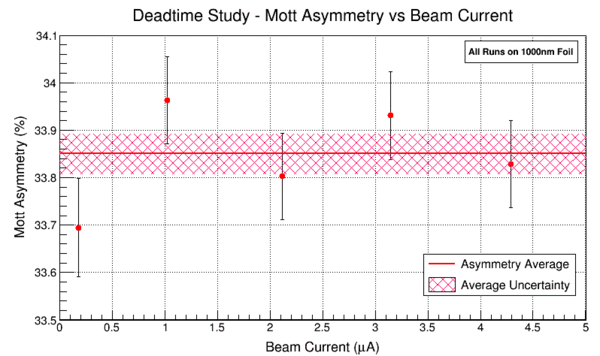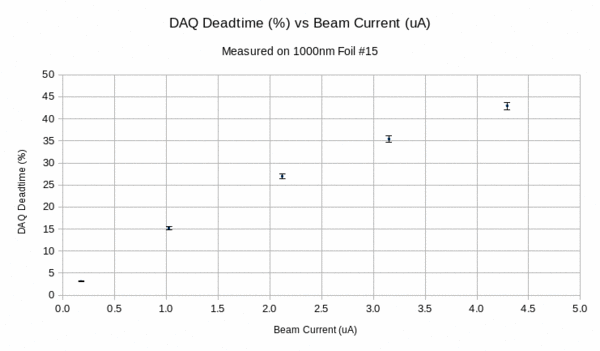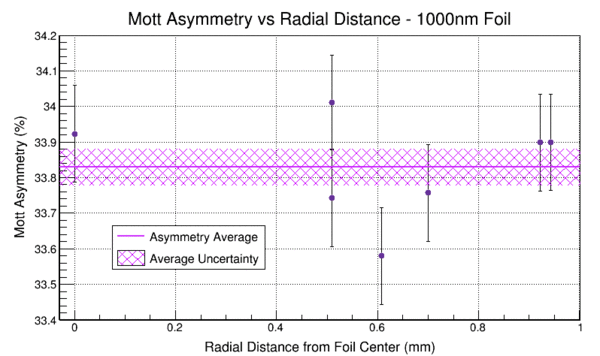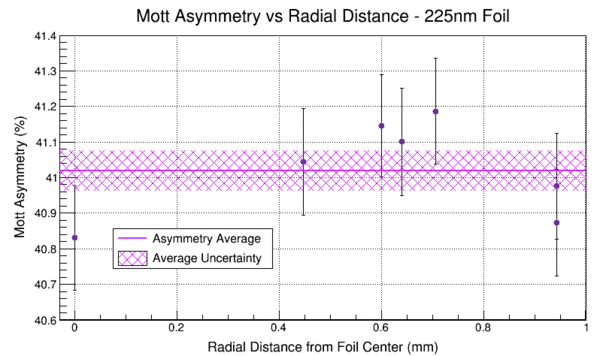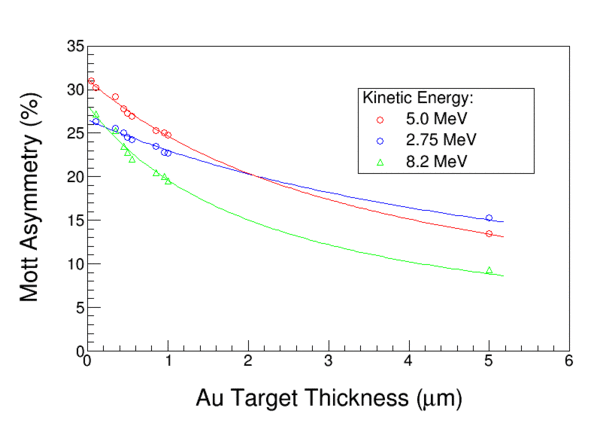Difference between revisions of "2018 Mott Paper Working Area"
| (33 intermediate revisions by 3 users not shown) | |||
| Line 3: | Line 3: | ||
* Back to Mott Homepage [[CEBAF_MeV_Mott_Polarimeter]] | * Back to Mott Homepage [[CEBAF_MeV_Mott_Polarimeter]] | ||
* Up-to-date Tech Notes, Paper Articles, etc. : '''[[Archived Documents]]''' | * Up-to-date Tech Notes, Paper Articles, etc. : '''[[Archived Documents]]''' | ||
| − | |||
| − | |||
*Run 1 | *Run 1 | ||
| − | ::Online Analysis Spreadsheet : [[media:run1database.ods]] | + | ::*Online Analysis Spreadsheet : [[media:run1database.ods]] -- Spreadsheet compiled while gathering data during Run I. Can be used as look-up table to determine which runs were used for which study. Asymmetry and rate numbers contained within are from preliminary analysis that does not include cuts, background handling etc. and so should not be referenced as final numbers. |
| − | ::Asymmetry vs Foil Thickness Full Analysis Spreadsheet : [[media:06.01.17_Run1_ARC+Dilution.ods]] | + | ::*Asymmetry vs Foil Thickness Full Analysis Spreadsheet : [[media:06.01.17_Run1_ARC+Dilution.ods]] -- Final analysis numbers contained within, to be used and referenced in paper. ARC = Asymmetry, Rate, and Cuts; i.e. the full-detail analysis from raw ROOT file to final numbers. |
*Run 2 | *Run 2 | ||
| − | ::Online Analysis Spreadsheet : [[Media:Run2RawData.ods]] | + | ::*Online Analysis Spreadsheet : [[Media:Run2RawData.ods]] -- Spreadsheet compiled while gathering data. Can be used as look-up table to determine which runs were used for which study. Asymmetry and rate numbers contained within are from preliminary analysis that does not include cuts, background handling etc. and so should not be referenced as final numbers. |
| − | ::Asymmetry vs Foil Thickness Full Analysis Spreadsheet : [[media:06.01.17_Run2_ARC+Dilution.ods]] | + | ::*Asymmetry vs Foil Thickness Full Analysis Spreadsheet : [[media:06.01.17_Run2_ARC+Dilution.ods]] -- Final analysis numbers contained within, to be used and referenced in paper. ARC = Asymmetry, Rate, and Cuts; i.e. the full-detail analysis from raw ROOT file to final numbers. |
| − | |||
*[[Data Analysis Working Area]] | *[[Data Analysis Working Area]] | ||
| + | ==Draft Punchlist== | ||
| − | + | === Request #1 -- Beam Current vs. Deadtime === | |
| − | |||
| − | === Request #1 === | ||
We measured dependence of electronic dead time on the beam current at five different average beam currents from 0.245-4.1 uA on a 1um foil. He'd like a plot showing the five data points vs. beam current with their individual uncertainties, and then the average with it's uncertainty band. | We measured dependence of electronic dead time on the beam current at five different average beam currents from 0.245-4.1 uA on a 1um foil. He'd like a plot showing the five data points vs. beam current with their individual uncertainties, and then the average with it's uncertainty band. | ||
| + | ::[[File:ROOT_deadtime_asym_v_beamcurrent.gif|600px]] | ||
::[[media:Deadtime vs beamcurrent.ods]] | ::[[media:Deadtime vs beamcurrent.ods]] | ||
| − | + | ||
| − | |||
::[[File:Avg deadtime v beamcurrent.gif||600px]] | ::[[File:Avg deadtime v beamcurrent.gif||600px]] | ||
| − | + | == Request #2 -- Measured Asymmetry vs. Beam Position on Target == | |
We measured dependence of the physics asymmetry on the position of the beam on the target foil from two target foils: 0.225um and 1um. For each foil we measured 7 asymmetries (one at center and six others away from center). The details are described in the systematics TN on the wiki. He'd like a plot showing the measured physics asymmetries (weighted average of IN/OUT) vs. radial distance from the center (instead of using x/y values shown in the TN), and then the average with it's uncertainty band, for the two target foils. | We measured dependence of the physics asymmetry on the position of the beam on the target foil from two target foils: 0.225um and 1um. For each foil we measured 7 asymmetries (one at center and six others away from center). The details are described in the systematics TN on the wiki. He'd like a plot showing the measured physics asymmetries (weighted average of IN/OUT) vs. radial distance from the center (instead of using x/y values shown in the TN), and then the average with it's uncertainty band, for the two target foils. | ||
| − | :: | + | ::[[File:Asym_v_beampos_1000.gif|600px]] |
| + | ::[[File:Asym_v_beampos_225.gif|600px]] | ||
| + | ::[[media:Asym v beampos final.ods]] | ||
| + | |||
| + | == Request #3 -- Plot of Asymmetry vs. Target Thickness from SPIN 2000== | ||
| + | Recreate Michael's Paper's Plot: | ||
| + | Remaking of Figure 6: [[media:Au_targetMSteigerwald.gif]]. The lines are a fit ( asym = a / (1.0 + alpha . d) ). On the original figure, the lines were his calculations. | ||
| + | ::[[File:Au_targetMSteigerwald.gif||600px]] | ||
| + | |||
| + | == Request #4 -- Example of FESEM Image == | ||
| + | We need an imagine of a typical FESEM picture showing a gold foil on a silicon substrate, or maybe 2 or 4 of them arranged to show typical measured you used in the analysis. | ||
| + | |||
| + | => Here are some examples of foil thickness, which set of foils would be interesting to use? => [[Media:foil_Thickness_status-5June2015B.pptx]] | ||
| + | |||
| + | == Request #5 -- Comparison of FESEM thickness vs foil position == | ||
| + | For two foils, two samples were prepared – one near the foil center and one near the edge, and each were measured. Where are those results (or FESEM images) ? | ||
| + | |||
| + | => Here is the summary of the measurements where two foils have "edge" and "center" values, is this sufficient ? [[Media:Summary_all_foils_5June2015C.xlsx]] | ||
| + | |||
| + | == Request #6 -- Ready for Review == | ||
| + | The detectors are centered at theta=172.6. We should check if S is maximum there or not. => The answer is that the maximum for KE=5MeV Au is 173.1 per Xavier and 129.9 per Ketevi. I think we erred perhaps so that the solid angle intercepted S at the same value left/right, or something like that. | ||
| + | * (Joe) Acceptance and Sherman Function [[media:160707_ShermancAcceptance.pptx]] | ||
| + | |||
| + | == Request #7 -- Absolute Calibration of BCM0L02 to FC#2 == | ||
| + | ::'''Run I -- BCM0L02 calibrated against FC#2''' | ||
| + | ::: https://logbooks.jlab.org/entry/3317350 | ||
| + | ::: https://logbooks.jlab.org/entry/3317351 | ||
| + | ::: https://logbooks.jlab.org/entry/3317359 | ||
| + | ::: https://logbooks.jlab.org/entry/3317361 | ||
| + | ::: https://logbooks.jlab.org/entry/3317362 | ||
| + | |||
| + | ::To calibrate BCM 0L02 against Faraday Cup #2, current was stepped up from 0 to ~7uA observing the 0L02 BCM Channel B counts. These values were then plotted against Faraday Cup #2's absolute beam current. The slope of the linear fit of this data was then entered into the controls for 0L02 BCM Channel B along with an offset determined with beam off. With this slope and offset dialed in, BCM 0L02 served as our current monitor during all Mott Runs. | ||
| + | |||
| + | [[File:Run1 BCM0L02 v FC2.gif|800px]] | ||
| + | |||
| + | :: '''Run I -- BCM VtoF Scaler against 0L02 BCM''' | ||
| + | ::: https://logbooks.jlab.org/entry/3322253 | ||
| + | ::: https://logbooks.jlab.org/entry/3449037 | ||
| + | |||
| + | ::To calibrate the Mott BCM VtoF scaler readout we plotted all Mott runs from Run I's VtoF scaler readout versus 0L02 BCM Channel B's current readback (the one calibrated against FC2), then performed a linear fit of the data to obtain an appropriate BCM gain and offset. These numbers were then used in the final rate analysis to calculate beam current. | ||
| + | |||
| + | [[File:Run1 VtoF v 0L02.gif|800px]] | ||
| + | |||
| + | ::'''Run II -- BCM0L02 calibrated against FC#2''' | ||
| + | ::: https://logbooks.jlab.org/entry/3354810 | ||
| + | ::: https://logbooks.jlab.org/entry/3354815 | ||
| + | |||
| + | [[File:Run2 0L02 v FC2.gif|800px]] | ||
| + | |||
| + | :: '''Run II -- BCM VtoF Scaler against 0L02 BCM''' | ||
| + | ::: https://logbooks.jlab.org/entry/3449037 | ||
| + | |||
| + | [[File:Run2 Mott v 0L02.gif|800px]] | ||
| − | + | == Request #8 -- Comparison of Absolute Detector Rate to Measured Detector Rate == | |
| − | + | ::*[[media:11.14.18 RunI RunII NormalizedRates.ods]] | |
| − | ::* | + | ::*[[media:RunI RunII RvT FitParameters.ods]] |
| + | [[file:RunII NormalizedRates byDetector.gif|500px]] | ||
| + | [[file:RunII NormalizedRates Average.gif|500px]] | ||
| + | [[file:RunI DetectorRates v Thickness.gif|500px]] | ||
| + | [[file:RunII DetectorRates v Thickness.gif|500px]] | ||
Latest revision as of 14:26, 19 December 2018
General Links/Documents
- Back to Mott Homepage CEBAF_MeV_Mott_Polarimeter
- Up-to-date Tech Notes, Paper Articles, etc. : Archived Documents
- Run 1
- Online Analysis Spreadsheet : media:run1database.ods -- Spreadsheet compiled while gathering data during Run I. Can be used as look-up table to determine which runs were used for which study. Asymmetry and rate numbers contained within are from preliminary analysis that does not include cuts, background handling etc. and so should not be referenced as final numbers.
- Asymmetry vs Foil Thickness Full Analysis Spreadsheet : media:06.01.17_Run1_ARC+Dilution.ods -- Final analysis numbers contained within, to be used and referenced in paper. ARC = Asymmetry, Rate, and Cuts; i.e. the full-detail analysis from raw ROOT file to final numbers.
- Run 2
- Online Analysis Spreadsheet : Media:Run2RawData.ods -- Spreadsheet compiled while gathering data. Can be used as look-up table to determine which runs were used for which study. Asymmetry and rate numbers contained within are from preliminary analysis that does not include cuts, background handling etc. and so should not be referenced as final numbers.
- Asymmetry vs Foil Thickness Full Analysis Spreadsheet : media:06.01.17_Run2_ARC+Dilution.ods -- Final analysis numbers contained within, to be used and referenced in paper. ARC = Asymmetry, Rate, and Cuts; i.e. the full-detail analysis from raw ROOT file to final numbers.
Draft Punchlist
Request #1 -- Beam Current vs. Deadtime
We measured dependence of electronic dead time on the beam current at five different average beam currents from 0.245-4.1 uA on a 1um foil. He'd like a plot showing the five data points vs. beam current with their individual uncertainties, and then the average with it's uncertainty band.
Request #2 -- Measured Asymmetry vs. Beam Position on Target
We measured dependence of the physics asymmetry on the position of the beam on the target foil from two target foils: 0.225um and 1um. For each foil we measured 7 asymmetries (one at center and six others away from center). The details are described in the systematics TN on the wiki. He'd like a plot showing the measured physics asymmetries (weighted average of IN/OUT) vs. radial distance from the center (instead of using x/y values shown in the TN), and then the average with it's uncertainty band, for the two target foils.
Request #3 -- Plot of Asymmetry vs. Target Thickness from SPIN 2000
Recreate Michael's Paper's Plot: Remaking of Figure 6: media:Au_targetMSteigerwald.gif. The lines are a fit ( asym = a / (1.0 + alpha . d) ). On the original figure, the lines were his calculations.
Request #4 -- Example of FESEM Image
We need an imagine of a typical FESEM picture showing a gold foil on a silicon substrate, or maybe 2 or 4 of them arranged to show typical measured you used in the analysis.
=> Here are some examples of foil thickness, which set of foils would be interesting to use? => Media:foil_Thickness_status-5June2015B.pptx
Request #5 -- Comparison of FESEM thickness vs foil position
For two foils, two samples were prepared – one near the foil center and one near the edge, and each were measured. Where are those results (or FESEM images) ?
=> Here is the summary of the measurements where two foils have "edge" and "center" values, is this sufficient ? Media:Summary_all_foils_5June2015C.xlsx
Request #6 -- Ready for Review
The detectors are centered at theta=172.6. We should check if S is maximum there or not. => The answer is that the maximum for KE=5MeV Au is 173.1 per Xavier and 129.9 per Ketevi. I think we erred perhaps so that the solid angle intercepted S at the same value left/right, or something like that.
- (Joe) Acceptance and Sherman Function media:160707_ShermancAcceptance.pptx
Request #7 -- Absolute Calibration of BCM0L02 to FC#2
- To calibrate BCM 0L02 against Faraday Cup #2, current was stepped up from 0 to ~7uA observing the 0L02 BCM Channel B counts. These values were then plotted against Faraday Cup #2's absolute beam current. The slope of the linear fit of this data was then entered into the controls for 0L02 BCM Channel B along with an offset determined with beam off. With this slope and offset dialed in, BCM 0L02 served as our current monitor during all Mott Runs.
- Run I -- BCM VtoF Scaler against 0L02 BCM
- To calibrate the Mott BCM VtoF scaler readout we plotted all Mott runs from Run I's VtoF scaler readout versus 0L02 BCM Channel B's current readback (the one calibrated against FC2), then performed a linear fit of the data to obtain an appropriate BCM gain and offset. These numbers were then used in the final rate analysis to calculate beam current.
- Run II -- BCM0L02 calibrated against FC#2
- Run II -- BCM VtoF Scaler against 0L02 BCM
